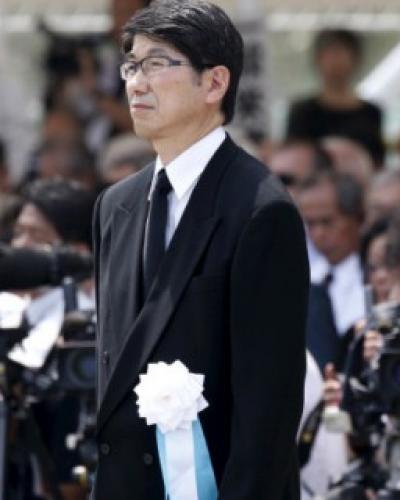Nagasaki, August 10 (RHC)-- The mayor of the Japanese city Nagasaki has criticized nuclear superpowers for resuming development and deployment of nuclear weapons, as the city marks the anniversary of Washington’s atomic bombing more than seven decades ago.
Mayor Tomihisa Taue used the 74th anniversary of the atomic bombing on Friday to call on nuclear superpowers to “assume responsibility” by setting a specific course to “drastically reduce nuclear stockpiles.”
“The present world situation involving nuclear weapons is extremely dangerous,” Taue said. “The achievements of human kind and the results of our longstanding efforts to rid the world of nuclear weapons are collapsing one after another, and the danger of a nuclear calamity is mounting,” he added.
“The atomic bombs were built by human hands and exploded over human heads. It follows that nuclear weapons can be eliminated by an act of human will,” the mayor said. He made the remarks days after U.S. President Donald Trump formally terminated the Intermediate-Range Nuclear Forces (INF) Treaty with Russia that had banned nuclear-capable missiles with ranges of 500-5,500 kilometers.
Many observers have warned that the treaty's demise would lead to an arms race between the U.S., Russia and China. This has concerned many, including the mayor of Nagazaki, who urged world leaders to visit the atomic-bombed cities of Japan and learn firsthand the inhumanity of nuclear weapons.
On August 6, 1945, the American B-29 bomber Enola Gay dropped its atomic payload over the Japanese port city of Hiroshima, ultimately killing 140,000 people. The bombing utterly destroyed almost everything within 10 square kilometers in the downtown area. Many died immediately while others succumbed to their injuries or radiation-related illnesses weeks, months, and years later.
Three days later, a second U.S. nuclear attack on Nagasaki killed another 70,000 people.
Hiroshima marked the anniversary of the atomic bombing on Tuesday, with the city’s mayor Kazumi Matsui calling on the government of Prime Minister Shinzo Abe to join the United Nations (UN) nuclear weapon ban treaty, known as the Prohibition of Nuclear Weapons (TPNW).
Mayor Taue also renewed the call on Tokyo, urging Abe to sign the treaty as soon as possible to represent the only country in the world to have suffered atomic attacks. He called on the government to “initiate efforts to make Northeast Asia a nuclear-free zone where all countries coexist under, not a ‘nuclear umbrella,’ but a ‘non-nuclear umbrella.’”
Taue was referring to America’s so-called nuclear umbrella, under which Washington is bound to protect Japan in an event of any nuclear threat. Japan, now one of the U.S.’s closest allies in Asia, hosts 50,000 American troops.
The Trump administrator is also planning to deploy new ground-based intermediate-range missiles (IRBMs) to Asia “sooner rather than later,” according to Pentagon chief Mark Esper. On Tuesday, U.S. national security adviser John Bolton justified the plan, saying the deployment is meant to protect US allies in the region, including Japan.
The plan drew reaction from China, which warned on Tuesday that any country accepting the deployment of the weapons would face retaliation.
“China will not stand idly by and be forced to take countermeasures should the US deploy intermediate-range ground-based missiles to this part of the world,” said director of the Chinese Foreign Ministry’s Arms Control, Fu Cong.
The United States is locked in a bitter trade war with China, as well as a row over what the US describes as freedom of navigation in the South China Sea, over which Beijing claims sovereignty.


